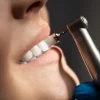
Root Canals are now quick and painless, thanks to modern technology
Root canals are one of those things that patients often feel apprehensive about having, but the reality is that most people will find it no more uncomfortable than having a filling. Root canals are an excellent preservative dental treatment that can help save an infected tooth when the only other option would be to have it extracted. This is something we always strive to prevent.Why Might you Need a Root Canal?
Root canals are carried out on teeth that have become infected, or where the central part of the tooth called the pulp has become damaged. A root canal treatment will remove the pulp, cleaning out all of the root canals before the tooth is sealed to prevent further infection.
If the pulp becomes damaged or exposed, then bacteria will be able to enter the pulp and can rapidly multiply, causing infection. Without treatment the pulp will eventually die and will continue to decay. The bacterial infection won’t cease with the death of the pulp, but will continue to spread throughout the tooth, eventually causing an abscess to form right at the tip of the tooth. In fact, it will spread into the surrounding bone and eventually into your entire body, affecting your overall health.
The pulp is the soft area right at the heart of the tooth and contains all the nerves and blood supply. The root canals are located within the roots of the tooth and extend from the tip of the root right into the pulp chamber.
The root canals also contain blood vessels and other connective tissue responsible for helping to keep the tooth healthy. Once a tooth has fully erupted then the nerve is no longer strictly necessary, as all it does is help sense whether something is hot or cold. Your newly restored tooth can function perfectly well without the nerves contained in the pulp.
Typical symptoms of an infected pulp include:
- Feeling severe toothache, or experiencing pain whenever you apply pressure to the tooth
- Experiencing prolonged sensitivity to hot and cold foods
- Noticing the tooth has become darker or discolored
- The gums around the tooth may begin to swell
If you experience toothache then it’s always worth contacting our dental office to make an appointment, even if the toothache seems to disappear. This is because there will always be an underlying reason as to why you developed toothache that will require investigation, and prompt treatment could help save your tooth. Sometimes it’s possible for the root canals and pulp to be infected, and to feel no symptoms whatsoever.
What is A Root Canal Procedure?
Root canal procedures can be completed in just one visit to our dental office, but occasionally more than one appointment may be necessary.
We’ll almost certainly need to take dental x-rays which will show us if there are any signs of infection in the surrounding bone, and these show us the shape of your root canals. The next step will be to remove the infection, and this is done by anesthetizing the tooth before accessing the pulp through the crown of the tooth. The pulp and root canals are cleaned out using a series of specially shaped files.
Once we’re sure all the bacteria have been removed then the tooth will be permanently sealed. The final step will be to restore the tooth. This is something that can be done through placing a dental filling, but if you have lost a significant amount of tooth structure then it might be necessary to crown the tooth. Root canal treatment is usually highly successful, and many root treated teeth can last for numerous years or even a lifetime.



